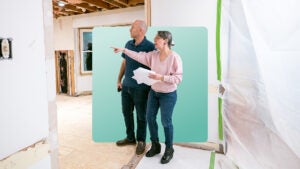Buying a home in Texas: A how-to

The headlines might be a bit worrisome for anyone thinking about putting down roots in Texas. Median prices for homes in the Lone Star State have hit new record highs in each of the past seven years, according to data from Texas Realtors. However, you don’t have to have a Texas-sized budget to buy a house here. In fact, nearly half of the homes sold in Texas in the first quarter of 2022 were somewhere between $200,000 and $399,000 — a relatively low price point for a state that is attracting so many newcomers. Whether you want to enjoy the music scene in Austin, the cowboy charm of Bandera or the coastal beauty of Galveston, read on for helpful tips to buy a home in Texas.
How to buy a house in Texas: A checklist
Decide where to live in Texas
Texas is famously huge, with no shortage of choices for where to look for a home. Bankrate’s list of the best places to live in Texas is a great place to start, offering an introduction to some of the key considerations in a home: affordability, safety, employment and opportunities to enjoy time away from work.
Don’t let the five cities on that list limit your search, though. Texas has so many destinations that might be a perfect match for your lifestyle. Use Bankrate’s cost of living calculator to see how much you’ll need to pay for all the essentials in different places — like food, transportation and utilities. For example, if you move to Dallas instead of Abilene, your cost of living will be around 5.5 percent higher.
As you look at different cities, it’s important to have a ballpark for your home buying budget. While the median price of homes in Texas is about $325,000, there are some places where the definition of affordability is quickly changing. Home prices in Irving, for example, have surged by 39 percent in the past year, and the median sales price now stands at $462,000.
Tips for buying a house in Texas
As you start your homebuying journey in Texas, you’ll want to compare mortgage rates. It’s important to have an understanding of potential loan limitations: In 2022, the conforming loan limit is $647,200 in every county in the state. So if you need to borrow more than that amount, you’ll be looking for a jumbo loan.
If your budget is smaller or your credit isn’t excellent, you will likely be considering FHA loans for your home purchase. Throughout most of the state, FHA borrowers are capped at borrowing $420,680 in 2022 — but in some counties, like Bexar, Comal and Denton, the maximum loan amount is smaller.
Things to know about buying a house in Texas
Property taxes
There are a lot of reasons to love living here, but the money you’ll owe the government for your new home is not one of them. Property tax rates vary across the Lone Star State, and they can include bills from school districts, cities, counties and special districts. They add up, too: Since there is no individual state income tax, the government has to make up the revenue somewhere, so be sure to inquire about annual property tax bills of any home you’re considering.
Dual agency
Texas does not permit dual agency, which is when the same real estate agent represents both the buyer and the seller in a transaction. So, you can rest assured that your real estate agent is solely focused on you and has no one else’s best interest in mind.
Seller’s disclosure
A seller in Texas is required to complete a disclosure statement that outlines all defects they are aware of in their home. Be sure to read this report carefully — there may be major issues you are not willing to take over.
Closing costs
In addition to a down payment, you’ll need to budget to cover closing costs. In 2021, they averaged around 1.5 percent of the purchase price in Texas, although the seller often pays for the title policy here. Be sure to ask your lender about closing costs related to them, too, which can include an origination fee, underwriting fee and other additional expenses.
Attorneys
You don’t legally have to hire a real estate attorney to buy a home in Texas. But it’s a worthwhile investment: By paying for an attorney’s time now, you can make sure you are protected in the future.
Climate and weather considerations
When you buy a home, you’ll need to pay to protect your investment. Unfortunately, that bill can be fairly large: Homeowners insurance in Texas is much higher than most other places in the U.S. And while Texas typically boasts a warmer climate, the winter freeze of 2021 proved that even the Lone Star State isn’t immune to cold-weather disasters. More than 400,000 homeowners filed claims for damages due to that storm, a signal for buyers to to make sure their policies have ample protection for worst-case scenarios.
How much house can I afford in Texas?
Before you figure out your budget for buying a home in Texas, it’s important to consider whether you’re actually ready for homeownership. If you have a good credit score, plenty of savings and plans to be here for a long time (or at least long enough to justify the closing costs), you’re likely a good candidate to become a homeowner.
While a number of factors will impact your budget, start with the 28 percent rule: You shouldn’t spend more than 28 percent of your monthly income on your monthly mortgage payment. So, if you earn $4,500 each month, you need to aim to keep your mortgage payment under $1,260. One way to shrink your monthly costs is to make a larger down payment upfront.
Saving for a down payment in Texas
If coming up with a down payment feels impossible, don’t worry: You might be able to find some assistance. If you’re a first-time homebuyer, you may be able to take advantage of a number of programs that are designed to ease your introduction to homeownership. For example, the city of Austin offers up to $40,000 for down payment and closing cost assistance to individuals whose income falls below a certain threshold. Corpus Christi, Dallas and Houston all have programs that make buying a house a reality for low-income borrowers. And while you’re working to save money for your down payment, be sure to consider these assistance options, too.
Get preapproved for a mortgage
Before you start looking for real estate, you ought to have a preapproval letter in your hand. Getting preapproved shows that you are serious about your search — and that a lender is serious about loaning you money. While it’s not a guarantee that your loan application will be officially approved, it sends a signal to a seller that a lender has looked at your financial picture, and likes what it sees.
Finding the best lender
Even though you’re buying a home in Texas, you don’t have to borrow money from an institution with an office in the state. Some mortgage lenders in Texas will help you secure financing with an all-online application. However, there are also plenty of lenders with in-person offices if you prefer face-to-face assistance with your application. Be sure to compare multiple lenders to find a deal with a combination of low fees and low rates to save money today and over the course of the entire loan.
Additionally, there are companies that will help you make a cash offer even if you don’t actually have all those greenbacks in your bank account. Ribbon, Knock and Opendoor all have programs that will help you finance an offer that can compete with all-cash buyers. It can be a difference-maker, especially if you’re selling your house while buying another.
Finding the best local real estate agent in Texas
Having the right real estate agent on your team can help you deal with the stresses and frustrations of being a buyer in a seller’s market. Realtors are focused on matching your budget with properties that fit your needs, and they often know when new homes are going to hit the market in advance.
Start house hunting
You can start your house hunting from the comfort of your couch. If any listings pique your interest, attend some open houses and ask your real estate agent to schedule private viewings. Go with an open mind: While you might have a list of everything you want in a home, being flexible can help you find a place you can tailor to your exact liking later. For example, an outdated kitchen doesn’t have to be a deal-breaker: Consider it an opportunity to customize your culinary corner with new finishes and appliances that better suit your taste.
Make an offer
When you find a place that feels like it could be home, your agent will help guide you through the process of putting together a competitive offer. He or she will have a sense of how quickly properties are moving and how many are fetching more than their asking price. In Houston, for instance, especially hot homes tend to go for 4 percent over list price.
Get a home inspection and appraisal
If your offer is accepted, congratulations! Not so fast, though. You still need to make sure it’s a good investment. The best way to protect yourself is a home inspection. These typically cost a few hundred bucks, but it’s well worth the money: A professional home inspector knows how to spot problems with plumbing, roofing, electrical wiring and more. In addition, an appraisal will be a requirement from your lender. It ensures that the home is worth the price you plan to pay.
Conduct a final walk-through and close on your new Texas home
The appraisal is done, the inspection looks good and your lender has sent you a closing disclosure. It’s time to conduct a final walk-through to verify that the seller has removed all their belongings and that the home is ready for your arrival. If you’re satisfied with the property’s condition, head to the finish line: the closing.
Closings can feel almost ceremonial. It’s you in a room with a few other people — attorneys, lenders, agents, often a notary — signing a lot of paperwork and turning over a lot of checks. After all those personal autographs, your work is done. You officially own a home in Texas.
FAQs
-
Yes. Texas continues to attract new businesses — major names like Tesla, Oracle and Caterpillar have all recently announced plans in the Lone Star State — which naturally means it is attracting new people, too. After all, people go where they can find opportunities to make money. So, it’s smart to buy a home now. If you’re ready to sell at some point down the road, all signs point to your property enjoying some serious appreciation.
-
You’re not the only one looking to buy a house here: Texas home sales have surged in recent years. Some markets, like Austin and Dallas, are insanely competitive, with average homes selling for significantly more than their list prices. Depending on where you’re looking to buy, you may need to be ready to submit an offer very quickly, and be prepared to compete with multiple other bidders.
-
It depends on where you’re looking to buy, and how much you can contribute to a down payment. In El Paso, median home prices are $230,000, but if you go to Austin, that figure jumps to $630,000. Wherever you decide to buy, you’ll need money in the bank to cover a down payment and closing costs. You’ll also want to make sure you have plenty left over to avoid the stress of draining your account to zero. Additionally, it’s not just about how much money you have; you also need a great credit score — above 700 is ideal — and a low debt-to-income ratio to qualify for the lowest mortgage rates available.
-
How much savings you need depends on how much you want to contribute to a down payment, and how much a lender is willing to loan you. For example, with some conventional loans, you might be able to put just 3 percent of the purchase price down. On a $300,000 home, that’s a down payment of $9,000. You’ll also need to make sure you have plenty of money to cover closing costs, which typically add up to around 1.5 percent of the purchase price, or $4,500 in this example. The median down payment in the state was $31,750 in March of 2022.
Why we ask for feedback Your feedback helps us improve our content and services. It takes less than a minute to complete.
Your responses are anonymous and will only be used for improving our website.






